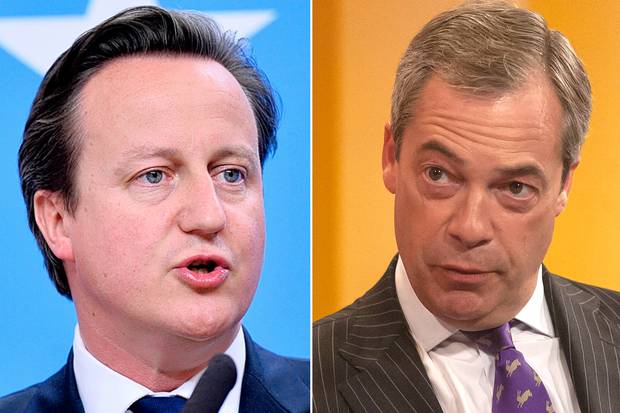In the past few weeks a major plan has been exposed between the Conservatives and UKIP to enter into coalition after the next General Election. The plan would see David Cameron continue as prime minister and Nigel Farage replacing Nick Clegg as his deputy. Other roles that UKIP members will hold in the Cabinet include the Home Secretary as well as sharing the spoils of the foreign office.
This startling revelation has come to light over a series of leaked phone calls between Cameron and Farage, over a period of six months, some of which we are now able to publish.
Call One: 16:43, 19th October 2013
The Greek economy and Angela Merkel’s (German Chancellor) views on the EU
Farage: They (Greece) are scavengers. Considering their (Germany) prosperity I simply don’t understand why she (Merkel) is standing for this state of affairs.
Cameron: I know, I know. It doesn’t seem quite right. I know that if she (Merkel) were to adapt her stance the more prospering nations within have a basis for renegotiation.
Call Two: 09:55, 5th December 2013
First Mention of Farage’s role as Deputy
Cameron: This won’t be an issue, Nigel. When you take his (Nick Clegg’s) role after the next election we will be able to address the problem. Until such time there is very little that can be done.
Farage: Then of course we will need it to pass the referendum.
Cameron: I doubt that will be an issue. Highly doubt it.
Call Three: 12.14, 22nd January 2014
Farage is concerned over UKIP seats
Farage: We may struggle to win enough to make this work.
Cameron: There are ways around it. Scotland will be gone before the years out, that will work for you. Besides there are other ways to form coalition without parliamentary representation. As long as my party backs it. They will back it.
The main issue when reading these manuscripts is understanding why Cameron is so willing to enter into coalition with UKIP. A professor of Political Science at the University of Manchester (who has asked to remain anonymous) has suggested that it could be a move towards silencing more pro-EU Conservatives. A coalition would limit their role in government and the combined forces of Euro Sceptic Tory’s and UKIP members could fast-track the UK’s withdrawal from the EU. Publicly, Cameron has presented himself in stark contrast over the Europe issue to how he presents himself in his private phone calls to Farage.
A modern historian from the University of Kent, after viewing the transcripts, has speculated that the implementation of Cameron and Farage’s plan after the next election could lead to a mass schism within the Conservative party which would lead to great instability and upheaval within British politics.
Of course this plan in itself can only be implemented if the Conservatives were to win a majority at the next election. This coupled with the fact that all of the above is an April Fool’s Day Prank and that the manuscripts presented are entirely false, means that a Conservative-UKIP coalition is extremely unlikely to occur after the next election in 2016.
Happy April Fool’s Day!

